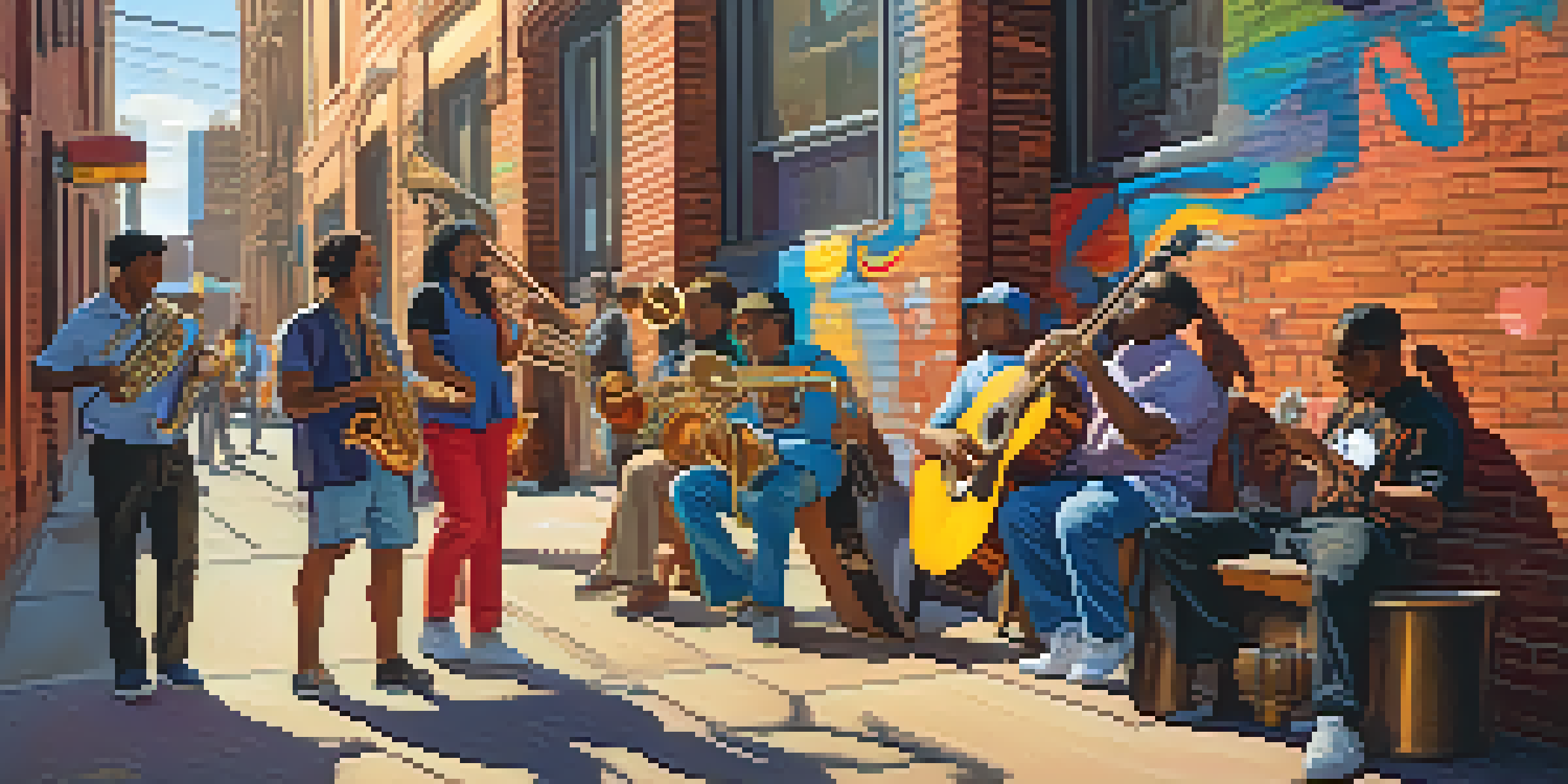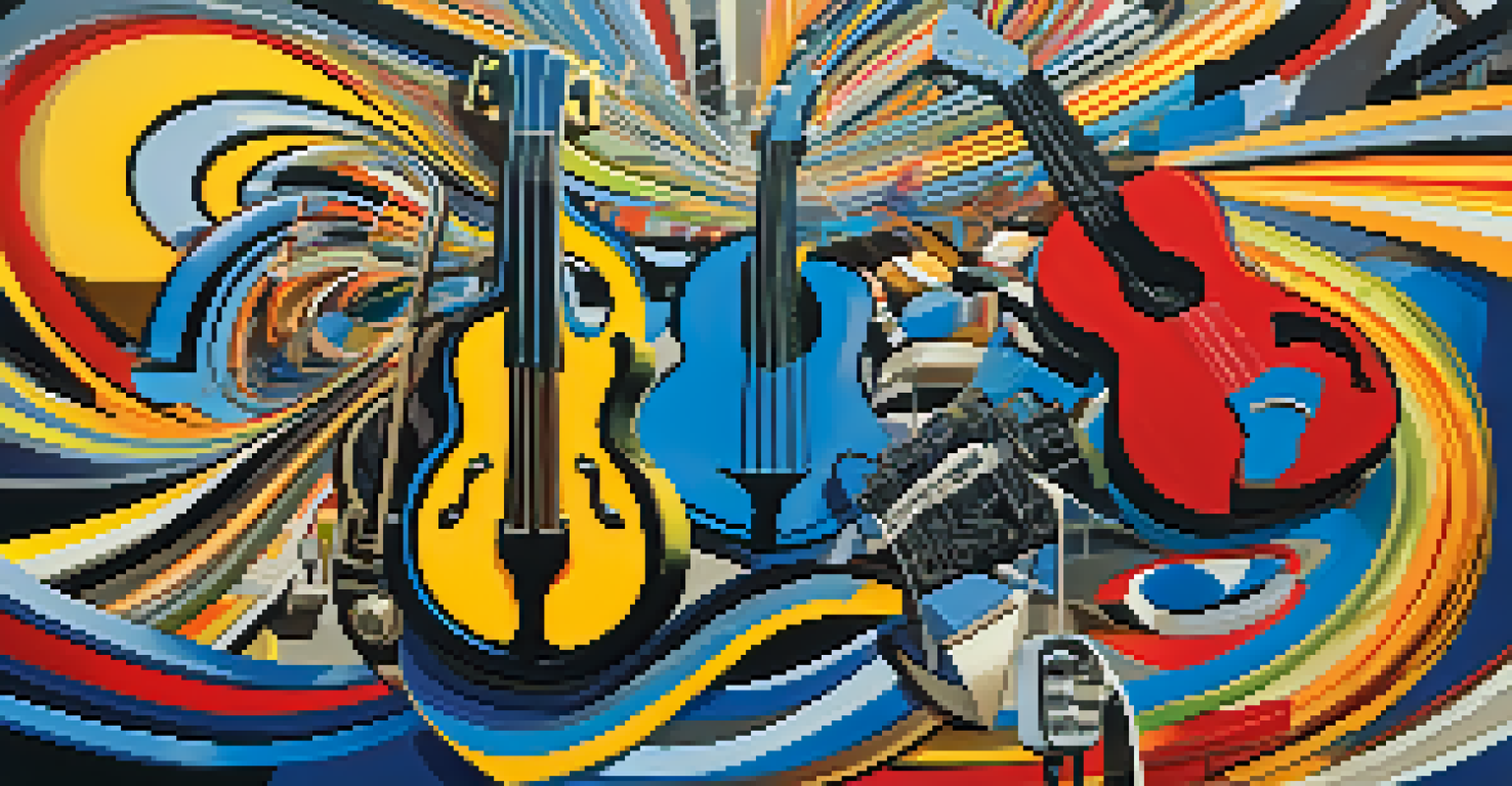Exploring the Concept of Music Genres and Subgenres

What Are Music Genres and Why Do They Matter?
Music genres are categories that help us classify different styles of music based on shared characteristics. They provide a framework for listeners to explore and find music that resonates with their tastes. From classical to hip-hop, genres play a crucial role in the music industry, influencing everything from marketing to radio play.
Music is the shorthand of emotion.
Understanding genres can enhance our listening experience, as it allows us to appreciate the unique attributes that define each style. For instance, the syncopated rhythms in jazz can feel quite different from the structured melodies of pop music. By knowing these distinctions, we can deepen our appreciation for the artistry involved.
Furthermore, genres help artists connect with their audience by setting expectations around their music. When someone says they enjoy rock, they likely have a certain sound in mind, which helps them find similar artists. This categorization is essential for both fans and creators in navigating the vast landscape of music.
The Evolution of Music Genres Over Time
Music genres are not static; they evolve over time, reflecting cultural shifts and technological advancements. Take rock music, for example, which emerged in the 1950s and has since branched into numerous subgenres, including punk, grunge, and alternative rock. Each new wave brings fresh influences, keeping the genre dynamic and relevant.

As society changes, so do musical tastes. The rise of digital technology and social media has facilitated the blending of genres, resulting in hybrid styles like electronic pop and country rap. This fusion showcases how creativity knows no boundaries, allowing artists to experiment and reach broader audiences.
Music Genres Enhance Listening
Understanding music genres helps listeners appreciate the unique attributes that define different styles.
Moreover, historical events often shape genre development. The civil rights movement, for instance, played a significant role in the evolution of soul and funk music. By examining these connections, we can appreciate how music not only reflects but also influences social dynamics.
Exploring Popular Music Genres: An Overview
Some of the most popular music genres include pop, rock, hip-hop, and electronic dance music (EDM). Pop music is known for its catchy melodies and widespread appeal, while rock often emphasizes instruments and live performances. Each genre offers a unique listening experience, catering to different moods and settings.
Genres are a way for music to speak to us, to create connection and understanding within the vast diversity of sounds.
Hip-hop has made a significant impact on global culture, combining rhythmic vocal delivery with powerful lyrical content. Its influence can be seen in fashion, language, and even politics. Meanwhile, EDM has transformed the way we experience music live, with high-energy festivals becoming a staple for fans around the world.
Each of these genres continues to evolve, showcasing the creativity and adaptability of artists. As new sounds emerge, they contribute to the rich tapestry of popular music, inviting listeners to explore and discover what resonates with them.
Subgenres: The Nuances Within Music Genres
Subgenres are specialized categories within a broader genre, offering a more nuanced understanding of musical styles. For example, heavy metal has subgenres like thrash metal and doom metal, each with its own characteristics and fan base. These distinctions allow listeners to dive deeper into their favorite genres.
Exploring subgenres can lead to fascinating discoveries. A fan of indie rock may find joy in the lo-fi sounds of bedroom pop or the energetic vibes of garage rock. Each subgenre carries its own history and cultural significance, enriching the overall genre experience.
Genres Evolve with Culture
Music genres reflect cultural shifts and technological advancements, leading to the emergence of hybrid styles.
Furthermore, subgenres reflect the diversity of musical expression. They allow artists to carve out their unique identities while still being part of a larger musical community. This interplay between individuality and genre affiliation is what makes the music scene so vibrant.
The Role of Music Streaming in Genre Exploration
With the rise of music streaming platforms, exploring genres and subgenres has never been easier. Services like Spotify and Apple Music offer curated playlists that highlight specific genres, making it simple for listeners to discover new artists. This accessibility has transformed how we consume music, breaking down traditional barriers.
Streaming platforms also use algorithms to suggest music based on user preferences, guiding listeners through the vast world of genres. For example, if you enjoy folk music, you might be recommended indie or acoustic subgenres that align with your tastes. This personalized experience encourages exploration and discovery.
Additionally, the global nature of streaming allows for cross-cultural genre fusions, as artists from different backgrounds collaborate and share their sounds. This interconnectedness enriches the music landscape, offering a more diverse array of genres to explore.
The Impact of Culture on Music Genres
Culture plays a significant role in shaping music genres. Regional styles often emerge from the unique cultural backgrounds of communities, leading to the development of genres like reggae in Jamaica or flamenco in Spain. These genres encapsulate the traditions, stories, and experiences of the people who create them.
Moreover, cultural influences can lead to the blending of genres, resulting in exciting new sounds. For instance, the collaboration between Latin rhythms and hip-hop has birthed reggaeton, captivating audiences worldwide. This fusion highlights how music transcends borders and brings people together.
Streaming Transforms Genre Exploration
Music streaming platforms make it easier for listeners to discover new genres and subgenres through curated playlists and personalized recommendations.
As we explore different music genres, it's essential to recognize the cultural context behind them. Understanding the roots of a genre can deepen our appreciation and connection to the music, allowing us to engage with it on a more meaningful level.
The Future of Music Genres: What Lies Ahead?
As technology continues to advance, the future of music genres is likely to be even more fluid and dynamic. With the rise of artificial intelligence and virtual reality, we may see entirely new genres emerge that we can't yet imagine. This innovation could redefine how we create and experience music.
Additionally, the blending of genres is expected to intensify, as artists increasingly draw inspiration from various styles. This trend could lead to a more inclusive musical landscape, where boundaries are blurred, and creativity thrives. The next generation of musicians may redefine what it means to belong to a genre.

Ultimately, the future of music genres holds exciting possibilities. As listeners and creators alike embrace change, we can look forward to a rich tapestry of sounds that reflects our ever-evolving cultural landscape, inviting us to explore and engage with music like never before.